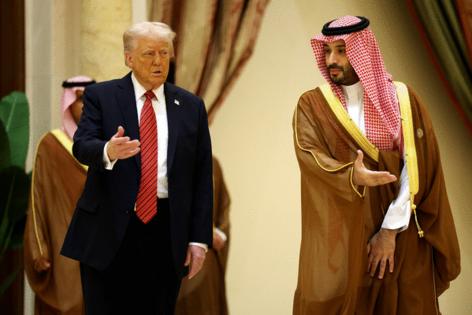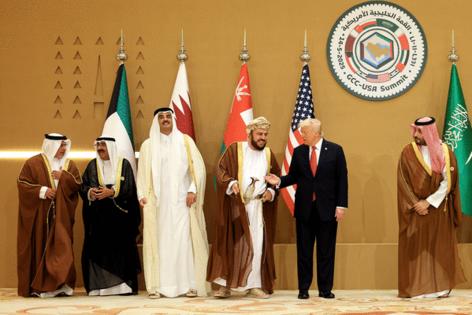US-Syria relations take new turn as Trump, Syrian president meet
Published in News & Features
RIYADH, Saudi Arabia — President Trump met Wednesday with Syria’s new leader, praising him as a “young, attractive guy” and urging him to rid his country of “Palestinian terrorists.”
Trump also urged Syrian interim President Ahmad al-Sharaa to sign onto the historic Abraham Accords brokered during Trump’s first term.
The meeting in Riyadh came as Trump concluded the Saudi Arabian leg of his Middle Eastern trip and headed to Qatar, the second destination of what has so far been an opulence-heavy tour of the region.
The meeting with Al-Sharaa, which lasted roughly half an hour and was the first time in a quarter of a century that the leaders of the two nations have met, marks a significant victory for Al-Sharaa’s fledgling government, coming one day after Trump’s decision to lift long-standing sanctions from the war-ravaged country.
It also lends legitimacy to a leader whose past as an Al Qaeda-affiliated jihadi leader — Al-Sharaa severed ties with the group in 2016 — had made Western nations keep him at arm’s length.
The sanctions were imposed on Syria in 2011, when the now-deposed President Bashar Assad began a brutal crackdown to quell anti-government uprisings.
Al-Sharaa headed an Islamist rebel coalition that toppled Assad in December, but the Trump administration and other Western governments conditioned the lifting of sanctions on his government fulfilling certain conditions.
Yet as is his custom, Trump cut through protocol and relied on personal relations, lifting the sanctions at the urging of Saudi Crown Prince Mohammed bin Salman and Turkish President Recep Tayyip Erdogan, a longtime supporter of Syria’s rebellion, who joined the meeting via phone.
Speaking on Air Force One en route to Qatar, Trump described Al-Sharaa as a “young, attractive guy. Tough guy. Strong past. Very strong past. Fighter.”
“He’s got a real shot at holding it together,” Trump added. “I spoke with President Erdogan, who is very friendly with him. He feels he’s got a shot of doing a good job. It’s a torn-up country.”
According to a readout shared by White House Press Secretary Karoline Leavitt on X, Trump urged Al-Sharaa to sign onto the Abraham Accords, tell “foreign terrorists” to leave Syria and deport “Palestinian terrorists,” help the U.S. in preventing Islamic State’s resurgence and assume responsibility for detention centers in northeast Syria housing thousands of people affiliated with Islamic State.
The Abraham Accords were the centerpiece of Trump’s foreign policy achievements in his first term. Brokered in 2020, they established diplomatic relations between Israel and the United Arab Emirates, Bahrain, Morocco and Sudan — without conditioning them on Palestinian statehood or Israeli concessions to the Palestinians.
Under Assad, Syria maintained a decades-old truce with Israel, despite hosting several Palestinian factions and allowing Iran and affiliated groups to operate in the country.
The move further cements the rise of Persian Gulf nations as global power brokers, adept at bringing about diplomatic breakthroughs in a number of conflicts and crises. Saudi Arabia has facilitated talks between Russia and Ukraine and worked on stopping the civil war in Sudan; Oman has been the key conduit in negotiations between the U.S. and Iran, while Qatar is an essential party in the torturous negotiations between Hamas and Israel.
The fight in Gaza has proven more intractable, with a push for a ceasefire floundering even as Israel has continued bombing Gaza, killing at least 50 people on Wednesday — including 22 women and 15 children — according to the Indonesian Hospital in the northern part of the enclave. Local health officials put Wednesday’s death toll even higher, with at least 70 killed, even as aid groups and the U.N. warned this week that some half a million people face starvation.
Asked if Trump’s Gulf-centered trip was a snub against Israel, the president answered that it was “good for Israel” for him to foster relationships with Middle Eastern countries. He added that he had informed Israel that he was lifting sanctions on Syria.
On the night of Assad’s ouster, Israel blitzed past long-established armistice lines with Syria and occupied border villages. It has warned Syria’s authorities that it will not permit any of the government’s forces south of the Syrian capital Damascus. Al-Sharaa has repeatedly said his country will not be a threat to its neighbors, including Israel.
Trump also addressed the possibility of attending Ukraine-Russia peace talks in Turkey on Thursday, saying that Russian President Vladimir Putin urged him to do so, even though it’s unclear if Putin himself would be attending.
“I know he would like me to be there. And that’s a possibility,” he said.
Secretary of State Marco Rubio is set to attend the talks.
“I don’t know that he (Putin) would be there if I’m not there,” Trump said. “We’re going to find out. Marco’s going and Marco’s been very effective.”
Pivoting to recent talks between the U.S. and Iran over Iran’s nuclear program, Trump said he would wait to see what further negotiations over the next week produce before he would consider secondary sanctions on Iran’s oil exports.
It was not clear which sanctions Trump was talking about. On Tuesday, his administration sanctioned more than 20 companies that were part of an Iranian network funneling oil to China, the Treasury Department said. That was followed up on Wednesday with a raft of sanctions targeting individuals and entities in Iran’s ballistic missile program.
Iran says it wants to develop nuclear power. Trump, saying Iran can never have a nuclear weapon, wants it to abandon its nuclear efforts.
“Hopefully they’re going to make the right decision because something is going to happen one way or another,” he said, adding that “they can’t have a nuclear weapon.”
“We’ll either do it friendly or we’ll do it very unfriendly, and that won’t be pleasant,” he added.
As Air Force One approached the Qatari capital of Doha, Qatari F-15s accompanied it for its landing. Trump effectively repeated his performance in Riyadh, pumping his fist in the air before descending the stairs to a red carpet, where he was greeted by Qatar’s emir, Sheikh Tamim bin Hamad Al Thani.
Diplomacy seemed paramount on the Qatari leader’s mind, telling Trump that he was “excited” to see him and that he knows him to be “a man of peace.”
“I know that you want to bring peace to this region,” the emir said. “I hope that this time we can do the right thing and bring peace here in the region.”
Trump said, “We’ll bring peace, not only here, but I know you’re very much involved in helping us in other regions, like what’s happening with Russia-Ukraine, etcetera.”
Qatar pulled out all the stops for its Trump welcome, accompanying the presidential motorcade with men on camelback, and arraying traditional dhows near the waterfront with Qatari and American flags.
Although white horses also appeared as the presidential limousine known as “The Beast” approached the entrance of the Qatari Royal Court, Trump later said that he appreciated the camels.
“We haven’t seen camels like that in a long time,” he said.
Later on, Trump, ever the real estate mogul, cast a discerning eye at the furnishings.
“The job you’ve done is second to none. You look at this, it’s so beautiful,” he said. “As a construction person, I’m seeing perfect marble. This is what they call perfecto.”
_____
©2025 Los Angeles Times. Visit at latimes.com. Distributed by Tribune Content Agency, LLC.










Comments